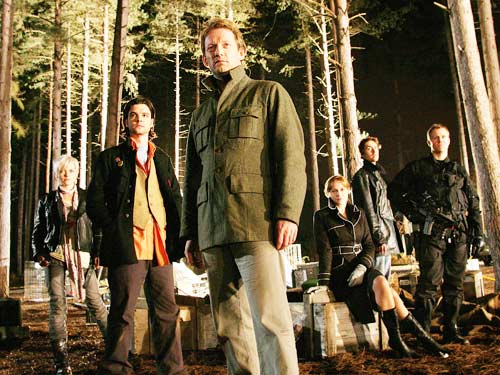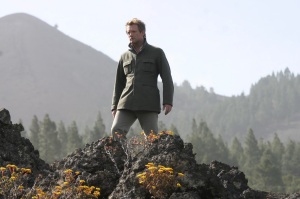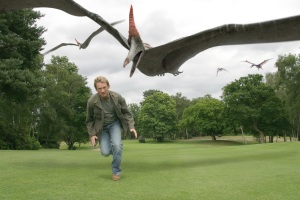ARChive 3: Douglas Henshall (Series 1)
The focal point of the first two seasons, Douglas Henshall’s Professor Nick Cutter gave Primeval a very different feel to other contemporary shows. Speaking to Paul Simpson at the end […]
The focal point of the first two seasons, Douglas Henshall’s Professor Nick Cutter gave Primeval a very different feel to other contemporary shows. Speaking to Paul Simpson at the end […]
 The focal point of the first two seasons, Douglas Henshall’s Professor Nick Cutter gave Primeval a very different feel to other contemporary shows. Speaking to Paul Simpson at the end of 2006, shortly before the show’s launch, he was looking forward to the public reaction to what he described as “The A-Team with monsters”…
The focal point of the first two seasons, Douglas Henshall’s Professor Nick Cutter gave Primeval a very different feel to other contemporary shows. Speaking to Paul Simpson at the end of 2006, shortly before the show’s launch, he was looking forward to the public reaction to what he described as “The A-Team with monsters”…
Was this a strenuous shoot?
I think when you’re setting up a new show, especially one as ambitious as this, it’s pretty difficult. Working with CGI is never particularly easy, because you’re working with balls on sticks pretty much all of the time. You go back to being a small child with your imagination, because you’re being asked to see monsters and react to essentially nothing, which is how you played when you were a kid. It’s making an arse of yourself and not minding too much!
And getting paid for it…
Oh, I’m not complaining about it. It’s nice to play and get paid.
Episode two with the spiders looks scarier than the first one.
I think the first one is setting up the world, so we can then take it a little bit further forward in the other episodes, once we’ve established things. First episodes are notoriously difficult, because you’re trying to establish characters and storylines – and chuck in a dinosaur here and there! I think the series gets stronger and stronger as it goes on.
What did they tell you about the series before you signed up?
I was sent scripts for the first three episodes, and I read them pretty much in one go, which was a good sign. I knew Cilla Ware, who directed the first three, as I’d worked with her before on a film about Arthur Conan Doyle that I did a couple of years ago.
I went in and read and it was all very quick. I think I went in on the Tuesday and they offered it to me on the Friday. The thing that attracted me to it was that I haven’t seen anything like this before on the telly, certainly not on British telly.
I thought there were so many ways it could go horribly wrong. It seemed like a very ambitious project, and somebody somewhere was really putting their neck on the line with what they’d decided to do. I thought it was a bit of a challenge, to make something like this work. The opportunity that I was given to play this professor was great. It’s not like anything I’ve ever done before. I thought, “This is daft! You have to do this if they’ll let you.”
How much of yourself did you bring to the character? Did he change as a result?
I don’t have anyone else to bring in! I don’t have any other frame of reference. I’m still finding ways in which I want to play this guy. It’s still evolving. I began to feel a little more comfortable about how I was playing it towards the end of the shoot, at least. It changes a little bit, but I think that’s quite natural. If it goes to a second series, it’ll be a little easier. You’ve got to try and see where you can take somebody. We didn’t get all six scripts in one go. We got the first three and then another three, so there was the thing of not necessarily knowing where it was going.
Were there revelations in the latter three that would have changed how you played the part?
It certainly made me think about things, but that’s the nature of television.
 What do you think of Professor Cutter as a person?
What do you think of Professor Cutter as a person?
If I was to try and sum him up, he’s reluctantly optimistic. He’s a career scientist – there for the love of the job rather than anything else. He explains to Connor that he’s looking for the bits that Darwin missed. Any possibility of finding something new and interesting and real is his kind of thing. He looks forward to his work. As far as his wife is concerned, I think that’s just one of those big things that certain people have, and have to live with, but I think it makes him slightly open-minded to all these things.
Some reviewers seem to think that the quest for his wife is driving him – though that doesn’t seem to be the case.
I think there have probably been many people over the years who have come and said, “We think we might have found this or that”, and it might relate to his wife. I think he’s a little bit like a mackerel, in that he will go for anything shiny in the water, because it’s something new he has to find out about. It’s a sidetrack to the job he does every day. He gets reluctantly pulled into this thing, and then, having discovered it, it opens up a whole new avenue for him.
He’s very cutting about Connor at first.
I think he looks at Connor kindly, but he’s like a Labrador who jumps around all over the place, and will lick you to death if you let him. He instinctively knows what’s good about Connor, but he knows that Connor’s got to learn what this is about, and it’s not about running about or talking about aliens. It’s something real and important, and you have to take it seriously. That ties in with what happened his wife. He’s a realist. He doesn’t go in for fancy stories.
He seems bristly with the civil servants, too.
I don’t think he likes anybody telling him what he has to do; I don’t think he likes authority particularly. I think he’s used to having a pretty free hand at the university where he works – going out and doing pretty much what he wants. I don’t think he reacts well to being straitjacketed in any way. But with something like that, were it to happen, why should that be government property purely? I don’t think he reacts well to that, because of his sense of fair play.
Was the character’s progress already decided, or were you able to alter his progression?
I was given pretty much carte blanche to play him as I wanted. Obviously, if the powers that be didn’t like what they were seeing, I think they would have had a word. But I suppose I made the decision that he wouldn’t be hugely enthusiastic and jumping about, wide-eyed at everything.
I wanted him to be a serious man because I wanted the stakes to be as high as possible. I wanted the people who were watching it to believe that what was happening was possible. I didn’t want to come at it from a viewpoint that it was just family entertainment, and be reasonably light-hearted and do everything with a smile. I wanted to approach it the way I would approach any drama that I was doing.
I think that making it believable is the only way to get an audience to come along with you. If they believe that you believe you’re seeing and dealing with what you’ve got to deal with, they’re far more likely to come with you.
If you don’t take it seriously, why should anybody else?
Exactly. And then it’s just a bit of fluff. That was the angle I was coming at it from.
 How much did you know about what you were supposed to be reacting to on set?
How much did you know about what you were supposed to be reacting to on set?
We were certainly given a lot of background information from Framestore. They were absolutely amazing and couldn’t have been more helpful. They took us down to their workshops and went through the whole process of how they create things: what these things are going to look like, the whole thing.
Plus, we had a first assistant director in Gareth Tandy who was prepared to jump around like a mad thing every day, making monster noises and waving balls on sticks, or whatever, just to be as helpful as he could. That was fun and very entertaining.
So we knew everything in every episode, except the last one, episode six. We didn’t know immediately what was going to happen in that one until a little bit further in. But I think they’ve done an extraordinary job with that. There’s something a wee bit special about episode six…
With the success of Doctor Who and now this, do you think we’re entering a new age for this sort of programme in the UK?
I don’t really know. Doctor Who is a franchise that has been around since I was a kid. It’s part of my childhood and I grew up with it. I think it’s a completely unique format, and I don’t think that Primeval has anything in common with it whatsoever. Primeval is like The A-Team with monsters. That’s more where we’re borrowing from.
It’s more of an American television format than anything else. This is an ensemble piece. It’s not about a professor and a sidekick. There are six of us, with six very strong characters. What we’re dealing with is something that happens in London, in real time, here, now. There’s a little bit of Indiana Jones and Jurassic Park kicking about, and The A-Team. I think that’s where we’re coming from.
As far as the effect this is going to have, I haven’t seen anything like this on British television, but whether there are spin-offs to come from it depends entirely on how successful it is. I think Doctor Who probably contributed in that people thought, “Oh well that works, so we’ll try it.”
It’s proved that there’s still a place for family entertainment.
I’d love to see it get back to that. Reality TV shows? I just wish that they had gone as far as they could go. It’s about cheaper and less. People will pretty much watch what you put in front of them on the telly. It’s a shame because you pay your licence fee to watch paint dry – literally. I want to see something that makes me excited on a Saturday night, and I think Primeval is that. You can never tell if something is going to be a success or not.
A show that grabs you and pulls you in will hold its audience.
That was apparent to me on the page when I first read this. I thought, if we can pull it off, it’s going to be great. When you’re standing there looking at thin air and trying to imagine a monster, you think, “I don’t know if it’s going to work or not,” but I went along to a cast and crew screening, to see the first and last episode, and thought, “If it doesn’t succeed, it isn’t because we haven’t done it right.” I think everybody has put a hell of a lot into it.
Public taste is fickle at the best of times! If it does get picked up for another series, where would you like to take Cutter?
I’ll be honest with you: I don’t think about things like where to take him as a character. I honestly don’t. Sorry if that’s boring. The only thing I think about a second series is that it’ll be great to do it if its ambition is to be better than the first. It’s the way they do it in America. If they believe in something, then they want everything to be better than it was before.
I think the possibilities are infinite in terms of what you can do with it. There are so many ways you can take it with the relationships that are built up. By the time you get to the end of episode six, you’ll see what I mean.
You could really take this anywhere now. With the worlds that are through these anomalies, the scope for what’s on the other side, and how far back you want to go, the possibilities are endless.
Check out the other ARChive pieces including this series 2 interview with Douglas Henshall